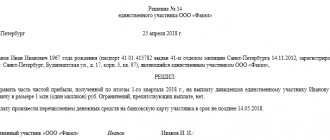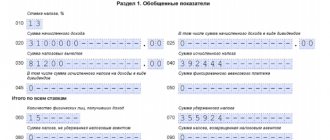Dividends are part of the profit of a commercial organization that is distributed among its participants. If the LLC participant is an individual, then he must pay income tax on dividends on income received from the business. In general, the personal income tax rate on dividends in 2016 is 13%, and two years ago it was 9%.
Read more: Dividends in 6-NDFL 2021: example of filling
Taxation of dividends
When paying dividends to the founders, the JSC or LLC must calculate, withhold and transfer the appropriate taxes to the budget. The company performs the duties of a tax agent, regardless of the taxation regime it applies (OSNO, USN, UTII, or Unified Agricultural Tax), and the taxpayer is the recipient of dividends.
The founders of the company can be both organizations and citizens - individuals. For dividends paid, taxation in 2017 includes: income tax withheld for legal entities and personal income tax withheld for individuals. The tax rate will depend on whether the founder is a resident or non-resident, Russian or foreign organization.
On what income can you get a tax deduction for purchased housing?
As you know, when purchasing real estate, the taxpayer has the opportunity to return the taxes he paid to the state. And if we were talking about wages, then the scheme is simple and clear. You can even draw up documents in such a way that the tax refund will actually be carried out by the employer, i.e. the employee’s salary is “increased” by 13% until the limit of 13% of the cost of housing (but not more than 2 million rubles) and 13% of the interest paid to the bank is exhausted. However, the question arises, what to do with other income?
In accordance with paragraph 4 of Art. 210 of the Code for income for which a tax rate other than the rate of 13 percent is provided, the tax base is determined as the monetary value of such income subject to taxation, without the use of tax deductions provided for in Art. Art. 218 - 221 of the Code.
Income tax on dividends
The rates applied for income tax on dividends paid to legal entities are distributed as follows:
- 15% – income tax on dividends of a foreign organization - founder; if an interstate agreement provides for a lower rate, then the tax is withheld at it;
- 13% - paid from dividends of Russian legal entities-founders,
- 0% - applies to dividends of a legal entity that, on the day the decision on “dividend” payment is made, continuously owns at least 50% of the share in the authorized capital for a year (365 days), or depositary receipts giving the right to receive at least 50% of all dividends of the company . The dividend tax rate of 0% does not apply to foreign legal entities - tax residents of the Russian Federation (except for those specified in clause 8 of Article 246.2 of the Tax Code of the Russian Federation).
The founder himself must confirm his right to a zero rate, for which he submits to the Federal Tax Service the necessary documents according to the list of clause 3 of Art. 284 Tax Code of the Russian Federation.
The company that paid them must pay income tax on dividends received.
All companies, even those that are “special regimes,” must report dividends in their income tax returns. This applies to both the paying company and income:
- Companies paying dividends fill out Section A of Sheet 03 of the declaration, which is drawn up separately for each decision on the distribution of profits. If dividends are not paid immediately, but in stages, the payment of tax is reflected in lines 040 of Subsection 1.3 of Section 1.
- Organizations receiving dividends fill out Sheet 04 of the Declaration. “Simplers” who received dividends from Russian companies do not need to file an income tax return, nor do they need to reflect the received dividends in the KUDiR (clause 2, clause 1, article 346.15 of the Tax Code of the Russian Federation).
“Dividend” income tax is transferred to the budget no later than the next day after payment to the founder (clause 4 of Article 287 of the Tax Code of the Russian Federation).
Filling out 3-NDFL on mortgage interest and the possibility of deduction
Filling out the 3-NDFL declaration is the same as for other types of expenses, that is, it is necessary to enter information about the taxpayer, his income and expenses. The interest declaration is formed as a single document with other deductions for the entire calendar year - standard, social or property, and in their absence - only for interest.
Receiving a property deduction for interest is the same as when receiving a deduction for the main mortgage loan. To do this, you need to fill out a declaration in form 3-NDFL and collect the appropriate package of supporting documents, which, in addition to the main ones, also includes a special document - a certificate from the bank about the interest paid.
Taxation of dividends for individuals in 2021
If the founder of the enterprise is an individual, the organization paying him dividends must withhold personal income tax from them.
It is likely that the taxation of dividends from individuals in 2021 will remain at the current level: since 2015, the income tax rate on resident dividends is 13%. Even if in 2021 the company pays dividends for years earlier than 2015, exactly 13% should be applied, because the tax is calculated at the rate in force on the day the income is received - on the day the dividends are paid (clause 1, clause 1, art. 223 Tax Code of the Russian Federation).
As for non-resident founders, their dividends are taxed at a rate of 15%.
When calculating personal income tax, it should be remembered that a resident individual can become a non-resident during the year, or vice versa, therefore his status must be determined on each date of payment of income. At the end of the year, the final status is determined and a rate of 13% or 15% is applied. If the status of an individual changes, personal income tax is recalculated for all income received since the beginning of the year (letter of the Ministry of Finance of the Russian Federation dated 04/05/2012 No. 03-04-05/6-444).
Just as now, no tax deductions apply to income tax on dividends in 2021, i.e. The entire amount of income received by the founder is taxed (clause 3 of Article 210 of the Tax Code of the Russian Federation). The tax base for personal income tax on dividends is determined separately from other income of an individual, even if the same rate applies to them.
Dividends and tax of the LLC are reflected in the 2-NDFL certificate with the sign “1” and submitted to the Federal Tax Service no later than April 1 of the following year.
It is not always possible to withhold taxes from an individual when paying dividends. If dividends in kind are paid to a founder who has no other income in the company, then the “dividend” personal income tax can only be calculated and then reported to the Federal Tax Service before March 1 of the next year by submitting a 2-NDFL certificate with the sign “2” to the founder ( Clause 5 of Article 226 of the Tax Code of the Russian Federation).
JSCs report on payments to shareholders by submitting information as part of the “Income Tax Declaration” (Appendix No. 2).
The agent must transfer personal income tax to the budget within the following terms:
- tax on dividends on JSC shares - 1 month from the date of payment of dividends to the shareholder (letter of the Ministry of Finance of the Russian Federation dated November 19, 2014 No. 03-04-07/58597),
- tax on LLC dividends - no later than the next day after the payment of dividends to the participant (clause 6 of Article 226 of the Tax Code of the Russian Federation).
Personal income tax on the income of several founders can be transferred in a single payment order.
Personal income tax for non-residents
The personal income tax rate on dividends received by non-residents of the Russian Federation is higher than for residents and amounts to 15%. A common misconception is to believe that all Russian citizens are recognized as residents. This is wrong. The concept of a resident of the Russian Federation is given in Article 207 of the Tax Code of the Russian Federation, from which it follows that he is an individual who was actually in the territory of Russia for at least 183 calendar days over the next 12 consecutive months. There is no indication of citizenship in this definition, so a foreigner can also be a resident of the Russian Federation.
That is, the mere presence of Russian citizenship does not automatically give tax resident status. To avoid paying personal income tax at a rate of 15%, track the number of days you are outside of Russia. But if you were absent for more than 183 days for valid reasons, such as treatment or training, then the days of such absence are not counted.
In addition, regardless of the time spent in Russia, Russian military personnel serving abroad and civil servants sent abroad are recognized as residents. True, this clarification has no special relation to personal income tax on dividends, because military personnel and civil servants, in principle, cannot engage in business, combining it with service.
Otherwise, we must remember that the personal income tax rate for non-residents is higher than for residents, and for income tax on dividends the difference is relatively small - 15% versus 13%. But, for example, personal income tax on sold real estate for non-residents is as much as 30%, and not 13% for those who were in Russia.
Calculation of tax by a dividend payer participating in other organizations
What tax on dividends must be paid by a tax agent who pays dividends to its founders, and at the same time receives income from participation in another company?
The answer to this question contains clause 5 of Art. 275 Tax Code of the Russian Federation. The amount of tax on dividends of Russian companies and resident individuals is determined by the formula:
- Tax amount = K x Tax rate x (D1-D2), where K is the participant’s dividends divided by the total amount of dividends paid by the agent,
- D1 – total amount of dividends paid by the agent,
- D2 – dividends received by the tax agent at the time of distribution of profits, and not previously taken into account when calculating the tax base.
If the company received more dividends than it paid out, i.e. the result is “minus” - no tax is paid.
Results
The tax on dividends is transferred to the budget by the legal entity paying them, withholding the amount of tax from the amounts accrued for payment. To calculate the amount of tax on payments to residents of the Russian Federation, a special formula is used that allows you to reduce the distributed amount of dividends by the amount received by the distributing person in a similar quality. When determining the amount of tax on payments to non-residents, such a reduction is not made. The rates applied to dividends paid to residents (13%) and non-residents (15%) also differ.
Information about payments made is included in the profit declaration (for legal entities always, and for individuals if the tax agent is recognized as such under Article 226.1 of the Tax Code of the Russian Federation) and in 2-NDFL certificates (for individuals, if information about payments is not submitted in the declaration).
If the participants are foreigners
To avoid double taxation, it is necessary to find out in advance which agreement is in force between countries. The seventh article of the Tax Code of the Russian Federation will tell about the priorities for the Russian side.
To take advantage of the privileges, management must prepare documents that would confirm the fact of carrying out activities in the territory of another state.
When paying dividends by individual founders, the latter must confirm payment of tax to the treasury of another country.
Otherwise, the citizenship of the founder will not affect the amount of tax. The declaration for this tax must be completed the day after the profit is received.
But this rule does not apply to organizations that operate under a simplified system. In such situations, income tax is included in the base when calculated according to the usual scheme, and is indicated in the usual declaration.
back to menu ↑
Payment nuances
Let's say a company transferred dividends on shares to its participants and paid personal income tax. However, the money was returned due to changes in shareholder details. Then, in fact, she is forced to transfer the amount of income to them a second time. This means that you do not need to remit the tax.
If the shareholder did not receive money as a result of errors with details, then his actual income is missing. Personal income tax, which was previously transferred to the budget, has the status of an overpayment that must be returned. If there was a subsequent transfer of dividends to him, then the tax is withheld and paid again. But the position of the Ministry of Finance is that the company may not return the overpayment, since it can be counted during the second call, without even drawing up a special statement.
Amount of tax to be paid
The following formula can be used for those who are interested in how payments are made.
D – dividends that went to the tax agent based on the results of the reporting period.
d – the total amount with dividends that must be paid.
Сн – tax rate designation
K is the ratio between the total amount and the dividends that are paid to individual shareholders.
N – income tax to which the amount is subject.
Important: negative numbers result from such calculations if the dividends received during the reporting period are not more than the amount that must be paid. Then shareholders do not receive payments.
back to menu ↑
For what period can a tax refund be issued when purchasing an apartment?
- the maximum amount of the cost of housing, according to which it is permissible to receive a refund, does not exceed two million rubles, regardless of the aspect of what specific amount was spent by the buyer;
- The maximum threshold for refunding funds is no more than 260 thousand rubles.
- application of the appropriate sample;
- a document that confirms the identity of the applicant;
- documentary evidence of a previously completed transaction for the purchase of a house or apartment, that is, a certificate of receipt of ownership;
- certificate of salary and payment of taxes for a certain period of time;
- declaration in accordance with form 3 personal income tax.
26 Jan 2021 etolaw 14307
Share this post
- Related Posts
- I live in the Chernobyl zone and work in Moscow, due to Chernobyl leave
- Calculation of housing and communal services benefits for labor veterans in Moscow
- Fss Ru Bailiff Altai Territory Find out Debt
- What to do if you are not paid a subsidy under the young family program
Tax deferment
An organization has the right to defer payment of personal income tax on dividends to the founder if it has a counterclaim against this person. For example, if the founder does not repay the debt or has not paid for the goods. Therefore, all counter debts must be offset. And if the founder’s debt is greater than or equal to the amount of dividends, then the company has the right not to transfer funds from dividends to him. It is as if she takes a deferment from paying personal income tax on such income.
The fact that the founder received income from which it was not possible to pay dividend tax must be reported to the tax office and to him himself no later than March 1 of the next year. Next, the participant or shareholder independently submits an income tax return, according to which he will pay the tax no later than July 15 of the following year.









